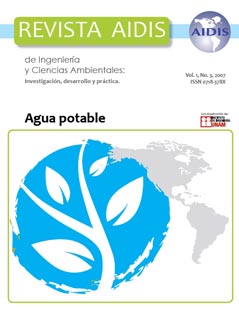Bacteriological study of water samples associated with diarrhea outbreaks in Costa Rica, 1999-2005
Main Article Content
Abstract
This article provides the results of the bacteriological study in water samples coming from aqueducts of communities in Costa Rica associated with diarrhea outbreaks between 1999 and 2005. The procedure followed in Costa Rica for facing this type of emergencies is described in the article, as well as the role of the Water National Laboratory of Instituto Costarricense de Acueductos y Alcantarillados (LNA), as part of the national net of laboratories for attending diarrheas and cholera diseases. In this case, the aim of the laboratory is to carry out a sanitary inspection in all the affected communities, testing water samples for isolating and identification of potentially pathogen bacteria and considered responsible of those waterborne outbreaks. During this events, the bacterial genus commonly isolated in water samples were the following: Escherichia coli, Salmonella spp, Shigella sp., Enterobacter sp, Citrobacter sp, Serratia sp, Providencia sp, Proteus sp., Klebsiella sp, Aeromonas hydrophila y Pseudomonas spp. Due to the great diversity of circumstances found on those studies, related to a diagnostic that allows establishing water role as transmission instrument of the etiological agent in diarrhea outbreaks, for classifying each circumstance it is proposed the “Qualitative System for Valuation the level of Importance of drinking water in the Transmission of Diarrheas. This system has several categories, the first one defines the responsibility of water as a mean of transmission in a diarrhea outbreak compared with the bacteriological results obtained and reported for the laboratories of the Costa Rican health system, until reach the category which excludes water when its quality is proved by bacteriological test. It is worth to mention that in some of the analyzed cases the bacteriological studies were applied to water samples but there were not applied to patients samples; in other cases the etiological agent was isolated in water samples, in theses cases there were not found termotolerantes coliforms, indicators of microbiological quality. The opportune intervention of LNA in attending those diarrhea outbreaks promoted an efficient decision making for applying corrective actions regards as water supply for controlling waterborne outbreaks.
Article Details
How to Cite
[1]
Valiente, C. and Mora, D. 2009. Bacteriological study of water samples associated with diarrhea outbreaks in Costa Rica, 1999-2005. Revista AIDIS de ingeniería y ciencias ambientales: Investigación, desarrollo y práctica. 1, 3 (Nov. 2009).
